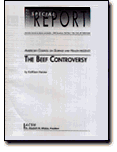![20040505_beefcont[1]](http://www.acsh.org/wp-content/uploads/2012/04/20040505_beefcont1.gif)

Beyond Beef alleges that cattle destroy the environment and cause world hunger. The scientific evidence does not support these views.With good management, cattle production need not ruin land or pollute the environment. Well managed grazing can actually improve the quality of pastureland and rangeland. Manure, when properly handled, is a valuable fertilizer rather than a damaging pollutant. The methane produced by cattle is only a very minor contributor to the so-called greenhouse effect. Cattle graze primarily on poor quality lands that cannot be used for crop production. On a worldwide basis, grazing more than doubles the land area that can be used to produce food for humans.Reducing beef production would lead to a decrease in the demand for feed grain, but it does not necessarily follow that the grain would become available to the world's hungry people. The more likely outcome is that farmers would not grow the grain because there would be no market demand for it, or it would be diverted to other uses. Grain typically constitutes only 15 to 20 percent of the total feed consumed by beef cattle in the U.S. The remainder consists of grasses and other cellulose-rich materials that humans and non-ruminant animals cannot digest. The raising of ruminant animals is the only way to transform these plant materials into food for human consumption.
Contrary to allegations made by Beyond Beef and others, there is little relationship between fast-food hamburger consumption in the U.S. and the destruction of rainforests in Central and South America. Only about 0.6 percent of the beef consumed in the U.S. comes from Latin American rainforest areas, and much of that is imported as cooked, canned products rather than as ground beef.
There was a 30 percent decrease in per capita beef consumption in the U.S. between 1976 and 1991. If Beyond Beef's arguments were valid, one would expect that this decline would already have produced demonstrable benefits for the environment and world hunger. Yet Beyond Beef has presented no evidence of any beneficial effects.
Lean beef, in reasonable serving sizes, can be included in a healthful diet that meets current dietary guidelines. Beef makes positive nutritional contributions to the diet; its iron and zinc content is especially important.
Residues of pesticides, antibiotics and hormones in beef are well within acceptable limits and do not pose a risk to the health of the American public.
As with all raw foods of animal origin, raw beef can be contaminated with bacteria that cause foodborne diseases. Adequate cooking kills these bacteria, making the meat safe to eat. With current technology, it is not possible for producers to guarantee that all meat sold to the public will be free from disease-causing bacteria. Therefore, food service personnel and consumers must do their part to prevent foodborne illness by handling foods in a sanitary manner and cooking them properly.
The U.S. Department of Agriculture intends to require new labels on all packages of meat and poultry which will give instructions for safe handling and cooking. This labeling program is worthwhile, but it should be extended to include eggs, fish and shellfish, as well as meat and poultry. All of these foods require thorough cooking to destroy microorganisms which may be present in the raw products.


